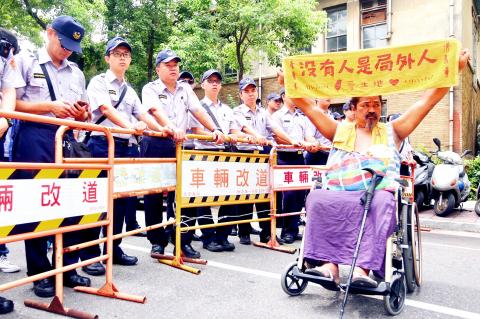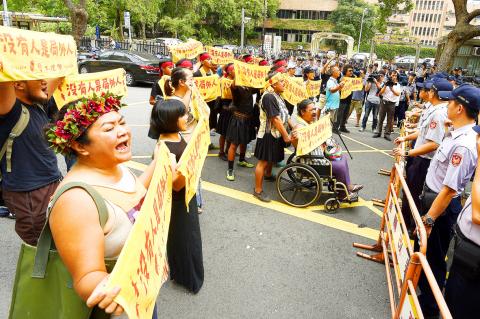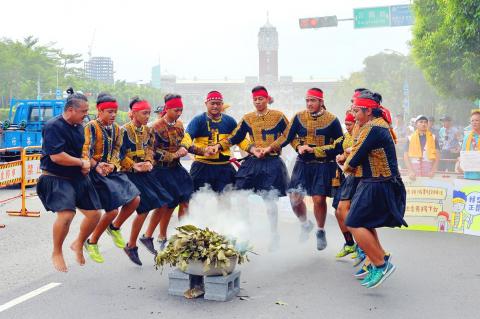Aboriginal rights campaigners yesterday condemned the government for having not carried out a promise to reinstate traditional Aboriginal territories, and they demanded that an independent agency be established to restore Aboriginal rights to land and transitional justice.
President Tsai Ing-wen (蔡英文) on Aug. 1 last year delivered a landmark apology to Taiwan’s Aborigines for their deprivation of rights in the hundreds of years since the mass migration of Han people began.
She promised to reinstate land rights, self-determination, economic development, cultural and language preservation and other rights protection.

Photo: CNA
Tsai yesterday said the government has worked to preserve Aboriginal languages and culture by immersing Aboriginal preschoolers and students in a learning environment where their native languages are spoken.
Aboriginal campaigners who have been staging a camp-out near the Presidential Office Building in Taipei for 160 days said Tsai had failed to keep her promises to restore Aboriginal rights.
They criticized the guidelines the Cabinet released on Feb. 14 on the delineation of traditional Aboriginal territories, which would restrict the application of the “traditional area” label to government-owned land, explicitly excluding private land.

Photo: Chen Chih-chu, Taipei Times
It would reduce recognized traditional territories from 1.8 million hectares to 800,000 hectares while companies would be allowed to develop traditional Aboriginal land that is now in private hands without the consent of local Aborigines, they said.
“Tsai promised that the government would prioritize the issue of traditional territories, but it turns out it is only limited to government-owned land,” Amis activist Panai Kusui said.
Documentary filmmaker Mayaw Biho, an Amis who has been an active member of the camp-out, called on the government to legislate an Aboriginal transitional justice law and establish an agency similar to the Cabinet’s Ill-gotten Party Assets Settlement Committee to investigate the deprivation of Aboriginal rights.

Photo: CNA
That would be a way to achieve understanding and reconciliation, he said.
The Presidential Office’s Indigenous Historical Justice and Transitional Justice Committee, which was established last year to understand the history of Aboriginal rights deprivation and reinstate those rights, does not have the necessary executive or investigative powers to perform its functions, Mayaw said.
“It is an irresponsible reform if the ruling party acts like it has done a lot and put in a great deal of effort in an effort to convince the public it is trying to tackle a problem,” Sunflower movement leader Lin Fei-fang (林飛帆) said.
Lin criticized Presidential Office Deputy Secretary-General Yao Jen-to (姚人多) and Democratic Progressive Party Legislator Kolas Yotaka for saying that the protesters do not respresent the nation’s Aborigines.
“Why can a person in power [Yao] be so careless about his authority, but treat protesters in quite a different way? What is the difference between the government and the Chinese Nationalist Party [KMT]?” Lin said.
The Executive Yuan said that efforts are under way to provide further protection to Aboriginal languages, land and resource rights.
The president has held talks with Aboriginal delegates, and the traditional territories delineation guidelines and landmark Aboriginal Language Development Act (原住民族語言發展法) have been promulgated, while legal rulings have been made to ensure that Aborigines could practice traditional hunting, fishing and harvesting, the Executive Yuan said.
The Cabinet has also completed the preliminary investigation into a government decision to deposit nuclear waste on Orchid Island (蘭嶼, Lanyu) without the knowledge and consent of the local Tao community when Chiang Ching-kuo (蔣經國) and Sun Yun-suan (孫運璿) were premier.
The Cabinet will create an institutional environment for the development of Aboriginal cultures and achieve transitional justice and harmony between ethnic groups, the Executive Yuan said.

INVESTIGATION: The case is the latest instance of a DPP figure being implicated in an espionage network accused of allegedly leaking information to Chinese intelligence Democratic Progressive Party (DPP) member Ho Jen-chieh (何仁傑) was detained and held incommunicado yesterday on suspicion of spying for China during his tenure as assistant to then-minister of foreign affairs Joseph Wu (吳釗燮). The Taipei District Prosecutors’ Office said Ho was implicated during its investigation into alleged spying activities by former Presidential Office consultant Wu Shang-yu (吳尚雨). Prosecutors said there is reason to believe Ho breached the National Security Act (國家安全法) by leaking classified Ministry of Foreign Affairs information to Chinese intelligence. Following interrogation, prosecutors petitioned the Taipei District Court to detain Ho, citing concerns over potential collusion or tampering of evidence. The

‘FORM OF PROTEST’: The German Institute Taipei said it was ‘shocked’ to see Nazi symbolism used in connection with political aims as it condemned the incident Sung Chien-liang (宋建樑), who led efforts to recall Democratic Progressive Party (DPP) Legislator Lee Kun-cheng (李坤城), was released on bail of NT$80,000 yesterday amid an outcry over a Nazi armband he wore to questioning the night before. Sung arrived at the New Taipei City District Prosecutors’ Office for questioning in a recall petition forgery case on Tuesday night wearing a red armband bearing a swastika, carrying a copy of Adolf Hitler’s Mein Kampf and giving a Nazi salute. Sung left the building at 1:15am without the armband and apparently covering the book with a coat. This is a serious international scandal and Chinese

Seventy percent of middle and elementary schools now conduct English classes entirely in English, the Ministry of Education said, as it encourages schools nationwide to adopt this practice Minister of Education (MOE) Cheng Ying-yao (鄭英耀) is scheduled to present a report on the government’s bilingual education policy to the Legislative Yuan’s Education and Culture Committee today. The report would outline strategies aimed at expanding access to education, reducing regional disparities and improving talent cultivation. Implementation of bilingual education policies has varied across local governments, occasionally drawing public criticism. For example, some schools have required teachers of non-English subjects to pass English proficiency

TRADE: The premier pledged safeguards on ‘Made in Taiwan’ labeling, anti-dumping measures and stricter export controls to strengthen its position in trade talks Products labeled “made in Taiwan” must be genuinely made in Taiwan, Premier Cho Jung-tai (卓榮泰) said yesterday, vowing to enforce strict safeguards against “origin laundering” and initiate anti-dumping investigations to prevent China dumping its products in Taiwan. Cho made the remarks in a discussion session with representatives from industries in Kaohsiung. In response to the US government’s recent announcement of “reciprocal” tariffs on its trading partners, President William Lai (賴清德) and Cho last week began a series of consultations with industry leaders nationwide to gather feedback and address concerns. Taiwanese and US officials held a videoconference on Friday evening to discuss the